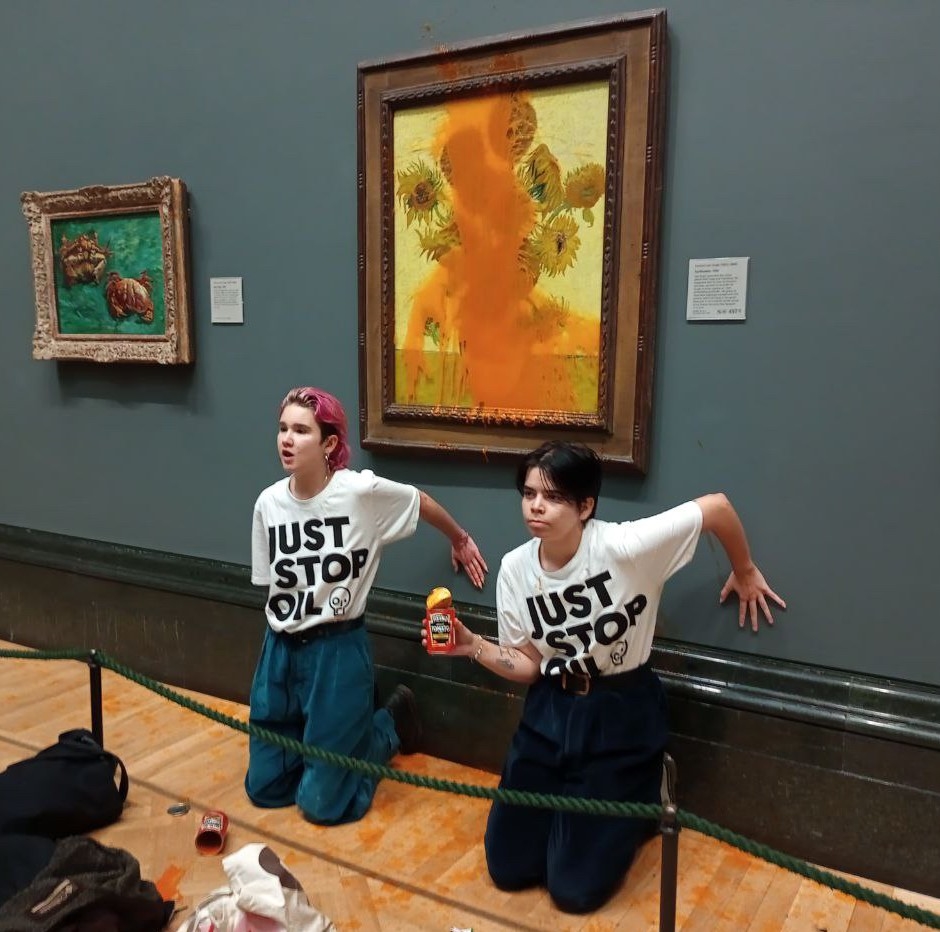Not a lot of people like Just Stop Oil. Even they admit they can be annoying. Journalists and politicians spend a lot of time denouncing and criminalising their chosen forms of protest. Even those who sympathise with their cause are inclined to criticise the group’s brand of civil disobedience as unreasonable or counterproductive.
It is therefore unsurprising that the most common thing I am asked when I tell people I am researching Just Stop Oil (JSO) is “why must they disrupt members of the public. Wouldn’t it make more sense to disrupt the oil?”
“I’ve been told so many fucking times, ‘go to Parliament Square, go to an oil refinery’ or whatever,” one female activist told me during a series of interviews with JSO members. “I’ve locked myself to an oil tanker for 36 hours. Nothing. I was just at Parliament Square for three days with 60,000 people, nothing happened. But my best friend throws soup on a fucking Van Gogh and we’re in the news for months.”
The group, among whose prominent members is the organic farmer and Extinction Rebellion (XR) co-founder Roger Hallam, emerged two years ago with a campaign of trespass and sabotage to disrupt fossil fuel infrastructure such as pumping stations and refineries. However, as the focus has shifted towards more public-facing forms of disruption, their profile has grown, and with it criticism of their tactics. In 2023 alone, the group staged headline-grabbing actions at the Chelsea Flower Show and the Proms, as well as at several key sporting events – an Ashes test, the golf Open at Hoylake, the World Snooker Championship and rugby union’s Premiership final. Most recently, and perhaps most noticed, was an attack at London’s National Gallery on the glass protecting The Toilet of Venus by Diego Velázquez, a painting that is totemic in the history of British protest, having been slashed with a meat cleaver by the suffragette Mary Richardson in 1914.
It is rare that Just Stop Oil members are given a platform to answer questions about their strategy. Research for my master’s thesis offered the opportunity to do this, and I conducted long-form interviews with 12 supporters, one of whom was then serving a prison sentence as a result of actions taken in the name of the group.
I first became aware of JSO in early 2022, when I noticed younger members of a local XR chapter leaving to join the new organisation. I was intrigued by JSO’s sense of energy as well as their references to the controversial book How to Blow Up a Pipeline by Andreas Malm, which argues in favour of property damage and claims that, while the success of the 20th century’s most notable social movements is often attributed to the power of non-violence, this erases the influence of more radical groups – the “radical flank” whose pushing of the envelope moves the debate along.
The appeal of direct action and ambitious acts of sabotage was discussed by some participants in psychological, and even existential terms. One referenced the recent film adaptation of How to Blow Up a Pipeline, saying: “You know that bit where she’s on her laptop and he’s on his laptop and they’re making the decision to act. I’ve been really feeling like that. I’ve been feeling really hopeless, and I don’t think I’ll get to a mental state of wellness in the last how many years I have on this earth unless I do something like that.”

And this is how one student member spoke about sabotaging petrol stations around London: “It was kind of nice to let your anger out on something physical; like an actual external thing of the climate crisis you know? These are the bombs, these are the things that are killing our earth, so I have a right to dismantle it if it’s in my home.”
For some who were previously supporters of the older group, the difference was palpable. In XR, one said, “You’d expect there to be some direct action going on but there was nothing… Oxford XR was like five old women. No offence, they were doing their best, but just like leafleting or running community stuff.”
Many interviewees spoke about how the sense of youthful energy, momentum, and militaristic fervour drew them to JSO. “It was a feeling of camaraderie, maybe that’s the word for it. Whereas with XR, you didn’t feel like footsoldiers in the same squadron, but you did in Just Stop Oil.”
JSO’s footsoldiers were initially deployed on an infrastructure-focused strategy devised by Hallam, who has spent several months in jail on remand in connection with JSO activities. At the time of writing he was on trial over his alleged involvement in attempting to use drones to ground planes at Heathrow airport in September 2019.
A local protest coordinator told me the strategy “has massively changed. It was originally a classic Roger Hallam idea. Almost too simplistic… which was that 12 oil terminals were responsible for 80% of the petroleum supply within the UK. So, if we get 3,000 people who are willing to take action, we’ll be able to hold those [terminals] for three weeks and massively affect the petroleum supply in the UK… and then that forces a response from the government.”
There is an attractive simplicity to the idea that environmental activism should focus directly on things that are destroying the planet. Yet most people I interviewed admitted that, while protesting at oil depots felt good, actions that focused solely on infrastructure were ignored by both the media and the government.

A senior JSO member explained: “With the infrastructure, it was brilliant because we shut that shit down. Problem was, nobody reported it. Nobody heard about it. It didn’t get out there because the media won’t cover you if they can’t vilify you. We hate having to rely on the media, but right now we need our messages in the heads of as many people as possible, and that doesn’t happen without the media being used as an amplifier.”
The global visibility the group achieved after throwing soup on Vincent van Gogh’s Sunflowers at the National Gallery in London in October last year was taken as evidence of the superiority of public-facing protest. This approach was again informed by radical flank theory, which claims that moderate social movements are more successful where they are accompanied by a less popular radical fringe.
One older supporter explained: “I read this study about radical flank theory, which found that there was a correlation between JSO actions like blocking the M25, and people going into groups like Greenpeace and Friends of the Earth. So that kind of shows that this is potentially working.”
The same local organiser who explained the logic behind the group’s initial infrastructure strategy told me: “If you’ve heard about the Overton window – shifting what’s seen as publicly possible – JSO are the radical flank and they’ve pissed everyone off… There’s been a lot of conversation about them, but it means that local councils can talk about climate policy, the amount of climate denial in the press might go down, and acceptance of activism might go up.”
But with added impact and visibility comes added jeopardy. One interviewee spoke at length about how the overwhelming scale of the climate crisis led people to take unnecessary personal risks and created a culture of “doom-ism” within the group. Others spoke more about how their well-being became subordinated to a sense of moral responsibility.

One member told me: “When you’re always thinking ‘I’m doing this to not be complicit in genocide’, even taking one healthy step for yourself, like not doing your fifth action in a row, is like: ‘is this my complicity? Is this me being a bystander?’ Because obviously, people in the movement have that kind of mindset where they’ll nag themselves about it, which is usually good. But yeah, it can really drive people a bit too far.”
Another said: “I was starting to see friends go to prison… we used to joke in the office that the career trajectory was just prison. Like in another job, your career trajectory would be promotion, and in this job, it was prison. I do think that was downplayed a lot and there were a lot of narratives around, like: you have to accept that, and you have to be OK with it. And it’s not OK to say ‘I don’t want to go to prison’.”
Part of what originally defined JSO was a pragmatic chain of command with a top-down structure. It allowed for some members to be unofficially employed and have their living expenses paid for, giving the group a sense of professionalism others lacked. Interviewees were almost always proud to say they were able to work for the group, often seeing this as a sign that JSO was serious, well-organised, and ready to mobilise quickly.
Yet other interviewees saw JSO’s professionalism resulting in undue pressure placed on activists. One told me: “We were numbers on a spreadsheet, not actual people who mattered because the narrative was ‘well, we’re all going to be dead in a few years if we don’t do this now’. Like, your life doesn’t matter. It was as if you were signing your soul away to do this, and we were guilt-tripped because we were told you’re so lucky to be able to be paid to do it. Then, because technically it wasn’t a job, we weren’t paid properly. They were paying our living expenses so we could volunteer. It meant there were no boundaries at all. You could never switch off.”
One supporter, who has since left the group, added: “Yeah, it was all too much at the time. And obviously, I’m anonymised, but from friends who are still at JSO, they said it got better when Roger went to prison because he stopped making ridiculous demands, and it became more of a two-way street.”
For some interviewees, subsequent moves away from direct action against the likes of oil depots – which now carry much longer prison sentences than before – have eased some of the pressure. The idea that members need to be better protected can be seen as contributing to the development of a new “slow marching” tactic, as activists are far less likely to be arrested for blocking traffic in this way than if they refuse to move or glue themselves to the road.
One told me: “We’ve diverted away from this whole thing of just getting arrested, not for the sake of it, not that we ever did that, but I think we need to be more strategic about how we’re using our arrests, and how we’re using people’s physical and mental capacity.”
As it heads towards its third full year of operation, Just Stop Oil seems to be learning to better protect its activists. But it will continue to wrestle with the idea that its civil disobedience needs to be designed to suit the agenda of the media that demonises it. The recent vandalism of the Velázquez painting at the National Gallery drew millions of eyes to the group, just as it did for the Suffragettes when Mary Richardson attacked it more than a century earlier.
It is clear now to JSO that protests that cause shock, anger, and confrontation attract more eyes than protests that “make sense”, such as blocking an oil depot. But that doesn’t mean they do not resent being forced to play into annoying stereotypes in order to generate confrontation.
One senior organiser told me: “Fifty young people sat on oil tankers for two days, is to me, really exciting. It’s what we need to be doing. But then in the right wing media, they don’t find that very exciting because there’s no one getting annoyed and no one getting angry.
“I mean maybe there’s a few drivers. But there’s not this kind of confrontation between public and protesters. And that’s what makes the news.” Sam Light’s thesis can be read here: tinyurl.com/3vdwkd8w. He is on LinkedIn: tinyurl.com/2xswjccz



